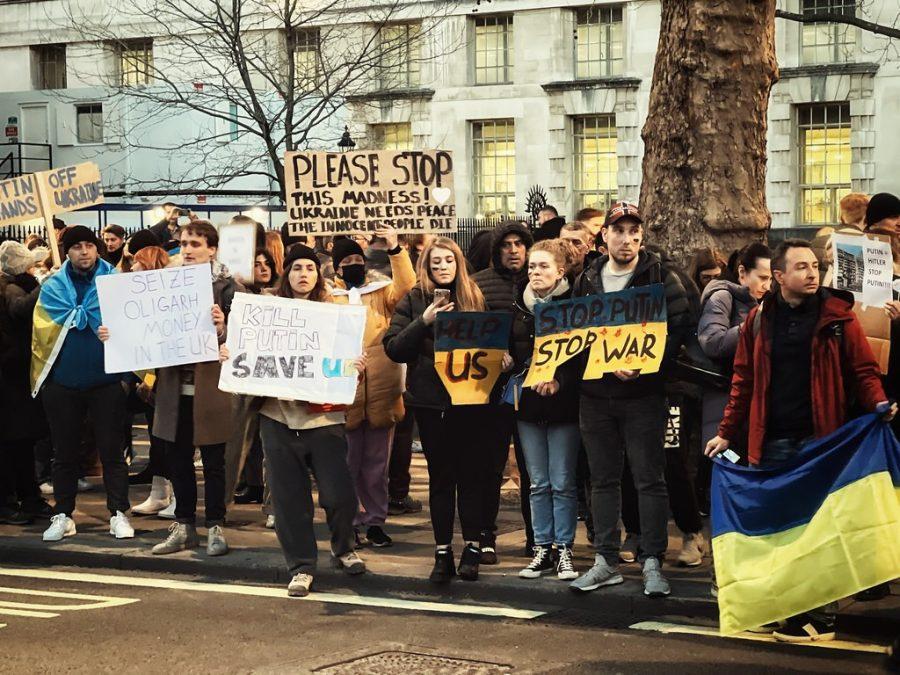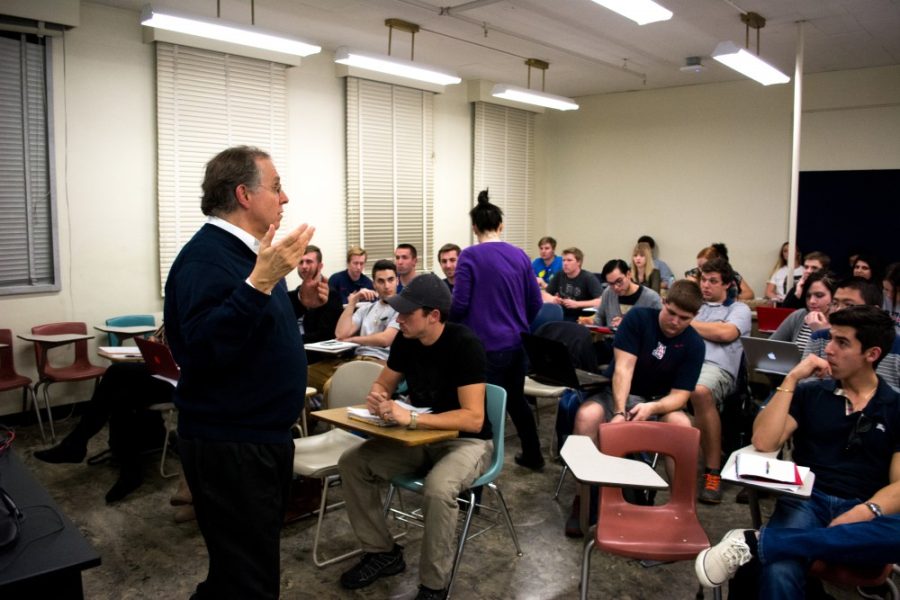It has been nearly four weeks since Russia launched its military invasion of Ukraine. According to the United Nations and the UN Refugee Agency, the escalating conflict has caused the displacement of 6.5 million people and has led to the deaths of over 800 Ukrainian civilians.
In response to the raging conflict and in an effort to inform students and the community, faculty from the University of Arizona and Arizona State University hosted a joint interdisciplinary Q&A virtual panel on Wednesday, March 16.
The panel, composed of faculty from various departments across both institutions, sought to catalyze a rounded conversation about the ongoing conflict and its social, geopolitical and economic ramifications.
The panel was organized and moderated by Olesya Zhupanska, a professor in the UA’s Department of Aerospace and Mechanical Engineering, and Irina Levin, associate director of ASU’s Melikian Center.
“We hope to reach broad audiences on both campuses and beyond and provide a nuanced coverage and intellectual discussion on the ongoing Russian invasion in Ukraine and its consequences,” Zhupanska said shortly before the panel. “I also hope that this panel will contribute to educating our students as future leaders with a global viewpoint.”
Yan Mann, a professor at ASU’s School of Historical, Philosophical & Religious Studies, opened the conversation by addressing how the conflict evolved in part as a response against perceived NATO encroachment as well as a reflection of Russian President Vladimir Putin’s desire to make Russia a primary international decision-maker.
“[Putin] wants to end a unipolar world order where, as he sees it, the United States dictates what happens in the international arena,” Mann said. “He wants Russia to take part in the [international] decision-making process, and you can see an example of that when it came to Russia’s involvement in Syria.”
Mann also commented on reports stating that Ukrainian military resistance has been greater than Putin and Russian military leaders expected.
“The Russian military was not prepared for a drawn-out campaign … . Putin and his commanders are reacting to a situation on the ground which is out of their control at the moment,” Mann said. “My guess is that Putin will settle for a ceasefire that will offer a guarantee that Ukraine will not [join] NATO.”
Victor Peskin, an associate professor at ASU’s School of Politics and Global Studies, spoke next. Peskin focused on how inconsistent action by the International Criminal Court and the West against Russian aggression — in particular following the annexation of Crimea — failed to deter the current crisis.
“The ICC has largely been missing since the annexation of Crimea eight years ago,” Peskin said. “This inaction can be explained by the fact that the ICC is a global court and lacks enough resources, but this is only part of the [reason]. The other part I believe is the [ICC] chief prosecutor’s reluctance to confront great international powers.”
Peskin commented on the need to amend ICC statutes to allow the international community to “prosecute Putin and high-level Russian officials for violating the UN charter’s sacred prohibition against aggression and unlawful invasion of a sovereign state.”
The conversation then moved to Ukrainian President Volodymyr Zelenskyy. Hilde Hoogenboom, an associate professor at ASU’s School of International Letters and Cultures, commented on how Zelenskyy’s image, as depicted by western media prior to the invasion, has not fully reflected his importance politically.
“When [Zelenskyy] was elected, we knew he was a comedian and that’s really what we thought about him, but in fact, who he is and what he’s done is very important,” Hoogenboom said.
According to Hoogenboom, Zelenskyy’s leadership has led Ukrainian national identity and sense of independence, especially in the years following the Russian annexation of Crimean peninsula in 2014. This, she suggested, has galvanized Zelenskyy and the Ukrainian government to confront Russian political aggression.
“Zelenskyy did what no previous president of Ukraine has done. He went after Viktor Medvedchuk and other Ukrainian-born Russian oligarchs,” Hoogenboom said. She also said that these actions may have disrupted Putin’s plan to establish a proxy government in Ukraine.
“There are a lot of strategic interests at play here, there have been for a long time,” Hoogenboom said.
Jane Zavisca, an associate professor at the UA’s School of Sociology, shifted the focus to the current displacement of the Ukrainian people and how the ongoing conflict will impact their daily lives, sense of justice and political viewpoints moving forward.
“We need to focus on the things [displaced] people need, the most important being safety and survival,” Zavisca said. “There will be many years of helping people rebuild their lives and return to a sense of what a normal life looks like.”
Zavisca also spoke on media perceptions of the Russian people, not just their political leaders.
“We hear a lot in the media about painting Russians with a very broad brush, complicit and brainwashed, buying into everything their government says,” Zavisca said. “And certainly, that may be fair for some segments of the [Russian] population, but I think that this is a very narrow understanding of social dynamics of both countries. I think, based on prior work, support for Putin is widespread, but this could definitely change if mobilized.”
Benjamin Jens, an associate professor at the UA’s Department of Russian and Slavic studies, followed Zavisca and touched on the role of religion in this conflict as well as the long history of tension between the Ukrainian and Russian Christian Orthodox churches.
In 2019, a high council of Christian Orthodox leaders presided over by the Ecumenical Patriarch of Constantinople granted independence to the Ukrainian Orthodox church, effectively separating it from its Russian counterpart. Jens suggested that this religious schism serves as an example of a growing sentiment of independence and freedom from Russian influence in Ukraine.
“We’re seeing some more questions of independence again and again. Questions of who controls what and how much influence Moscow should have, not just economically and politically but also in the spiritual realm,” Jens said.
Doug Weiner, a professor at the UA’s Department of History, started his comments by saying, “Putin’s invasion of Ukraine is categorically unjustifiable.” Later in the panel, Weiner described actions by the United States and European nations that he says have influenced the origin of this conflict.
“We’ve seen a failure of the American media, of congressional discourse as well as academic discourse,” Weiner said. “What has been left out of this whole picture is that it is not a battle between good and evil. It is a battle between the so-called West, the United States and our European allies, and an invasion by Putin despite the West historically engaging in the same kinds of invasions that Putin is and has undertaken.”
Weiner continued by saying that the West’s long history of pushing Russia away led to a lack of connection and integration with the world, leading to increased isolation and the establishment of an expansionist and imperialistic Russian state.
The panel discussion concluded with remarks from Pavlo Krokhmal, a professor at the UA’s Department of Systems and Industrial Engineering. Krokhmal, born in Ukraine, spoke on the militant and aggressive rhetoric that he said has been commonplace in Russia for decades after the collapse of the Soviet Union.
“I grew up in the Soviet Union. When it collapsed, I was a freshman in college. During that time, nobody really believed in the communist propaganda. However, this type of propaganda is what the Russians and elites have been imposing on their population … and it has been more effective. Some Russians believe that Russia is surrounded by enemies and that they need to fight NATO. They believe Ukraine is controlled by foreign powers and that they are fighting NATO by fighting Ukraine.”
Krokhmal concluded his comments by urging people to understand that this conflict is not simply a dispute between former Soviet republics. “It is a much larger conflict because it really [represents] Putin issuing a direct challenge to the West,” Krokhmal said.
A common theme throughout the panel was the need for students from all fields of study to have a better understanding of what happens around the world. After the panel, Zhupanska, who grew up in Ukraine and whose family is currently displaced as a result of the continuing violence, reflected on why she felt the school needed to continue the dialogue around the invasion.
“I think our students need to learn more, not just about what happens on campus, but also in the world,” Zhupanska said. “As educators, we often say we are striving to prepare future leaders and disruptive problem solvers … so, I want my students to have a global, interdisciplinary perspective.”
Zhupanska said she hopes this panel will be one of many future events that catalyze a conversation about the conflict.
“I would like to bring many different perspectives into the conversation, not only about the war in Ukraine but also about how politics, economics and humanitarian issues intersect during complex situations,” Zhupanska said.
Follow Andres Diaz on Twitter









